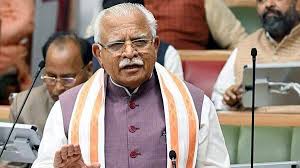Union Minister of Power and Housing and Urban Affairs Manohar Lal Khattar on Thursday said that India will fully leverage the current suspension of Indus Waters Treaty (IWT) to enhancing its infrastructure.
Khattar was speaking media in Srinagar after a review meeting with J&K Chief Minister Omar Abdullah.
Khattar emphasized the importance of Jammu and Kashmir’s potential for hydroelectric power generation due to its mountainous terrain.
“There’s good progress on hydro projects across the Jhelum, Chenab, and Sindhu rivers. NHPC and local companies are jointly pushing these initiatives forward,” he stated.
He emphasized that the government would increase the capacity of existing infrastructure projects, especially those that are currently under construction.
Khattar further revealed that the Centre is also considering several new projects that can be initiated due to the IWS suspension.
“We are exploring new possibilities,” he added.
The IWT was suspended by New Delhi a day after the April 22 attack on tourists in Pahalgam, in which 26 people were killed.
The Union Minister praised J&K for its significant advancements in the power sector, particularly in the adoption of smart and prepaid smart meters, placing it ahead of other states.
He noted that “very satisfactory work” was being carried out and commended the synergy between the Central and state governments in addressing several issues.
“In the area of smart meters and prepaid smart meters, Jammu and Kashmir has taken a lead over all other states. In fact, it has become number one in the country,” he said.
However, the Minister acknowledged that the J&K still faces challenges, particularly in power distribution and energy losses. “The AT&C (Aggregate Technical and Commercial) losses here are higher than the national average, but the rate at which they are being reduced is commendable,” he said.
He also spoke about financial gaps in the power sector, particularly the difference between Average Cost of Supply (ACS) and Average Revenue Realized (ARR), which continues to be above the national average.
“There has been substantial improvement over the last four years, but more work is needed,” he said. (AGENCIES)







